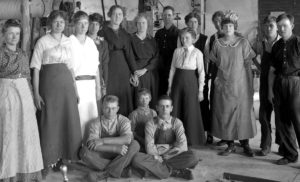Building a Lasting Legacy through Affiliation

The Baron Woolen Mills in Brigham City, Utah, was formed in the 1870’s by my Great-Great Grandfather, James Baron Sr. When he passed away, my Great-Grandfather, Thomas Baron (middle back row), inherited the mill when he was just 18 years old. Although Thomas was still very young, he understood that he could not build a legacy alone, but needed the help and expertise of all those around him. With just a handful of employees, and a vision of the future, they would build a lasting legacy. The Baron Woolen Mills eventually became globally known as one of the top producers of wool blankets on the planet. The mill was eventually sold in 1988; however, the Baron Woolen Mills blankets are still highly sought after and will set you back several hundred dollars. That is, if you can talk the person who owns it into parting with it.
Affiliation is defined as “the state or relation of being closely associated or affiliated with a particular person, group, party, company, etc.” What we’re talking about when we refer to affiliation is the creation of deep bonds that are not easily altered or shattered. There is a big difference in a casual but distant relationship with one’s employees, and a closer professional relationship that exists through mutual respect, understanding, and compassion.
I have been working with an organization that became very successful in a relatively short period of time. The organization grew from a few employees to several hundred with an annual revenue over $300M. By all indications, the outside view of the company is one of a succesful company. However, as the organization grew, a gap between senior leadership and employees began to grow. Employee reviews of the organization began to turn for the worse and turnover increased to more than double the industry standard. On several of the negative reviews that were posted, a member of the senior management team would reply stating that the review was fake and that the employee posting the review obviously never worked there. However, reviews from management level and higher were very good. Over time, senior management had removed themselves from the people in their organization and had developed clear lines of seperation. The opportunity for affiliation within the organization had been greatly diminished.
No matter how much revenue you bring an organization, you will be forgettable to your employees if you do not put an effort into forming strong bonds. Your legacy as a leader is much more than what you perceive it to be — truly, it lives and dies by what your employees perceive it to be, as they are the ones who will be sharing and discussing it.
Do you spend enough time with your employees to have a legacy as a leader? Or will you begin to fade from employee’s minds the moment you retire or leave the organization? The bonds you now have with your employees will in time, build or break your legacy.

